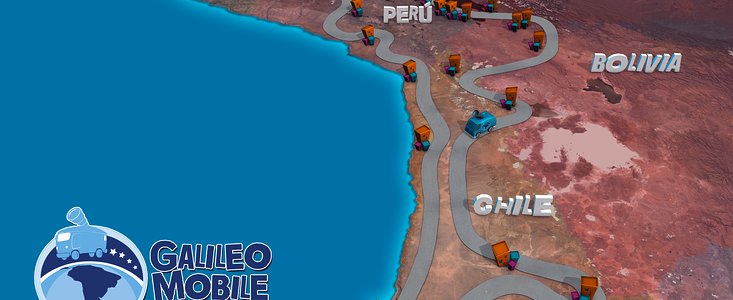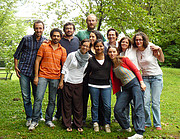Komunikat prasowy
The GalileoMobile starts its South American voyage
Astronomy education goes on tour through the Andes Mountains
5 października 2009
Today marks the beginning of the GalileoMobile Project, a two-month expedition to bring the wonder and excitement of astronomy to young people in Chile, Bolivia and Peru. Supported by ESO and partners, a group of astronomers and educators will travel through a region of the Andes Mountains aboard the GalileoMobile, offering astronomical activities, such as workshops for students and star parties for the general public. Professional filmmakers on the trip will produce a multilingual documentary capturing the thrill of discovery through science, culture and travel.
The GalileoMobile is a Special Project of the International Year of Astronomy 2009 (IYA2009), which is a global celebration commemorating the first use of a telescope to view the Universe by the Italian astronomer Galileo four hundred years ago. The project will promote basic science education through astronomy by visiting schools and communities that have limited access to outreach programmes. The GalileoMobile will provide these underserved groups with hands-on activities and educational material from international partners. The van is fully equipped to offer unique sky-observing opportunities for young students and other locals, with star parties at night and solar observations during the day. The team will use various tools including IYA2009’s handy Galileoscopes, which will be donated to the schools after the visits. By stimulating curiosity, critical thinking and a sense of wonder and discovery for the Universe and our planet, the GalileoMobile Project aims to encourage interest in astronomy and science, and exchange culturally different visions of the cosmos.
Spearheading the initiative is a group of enthusiastic Latin American and European PhD students from the European Southern Observatory, the Max Planck Society, the University Observatory Munich, and the Stockholm University Observatory. This itinerant educational programme is intended to reach about 20 000 people during eight weeks in October and November 2009, and will cover 5000 kilometres. The voyage will largely take place across the Altiplano, or high plateau, shared by Peru, Bolivia and Chile, which is among the poorest regions in these countries.
South America and the Andes Mountains were particularly chosen for the GalileoMobile Project for several reasons. IYA2009 already has a strong presence in the region through national contacts, including three Cornerstone IYA2009 projects: Developing Astronomy Globally, Universe Awareness and the Galileo Teacher Training Programme, which are all official partners of the project. Most people in Peru, Bolivia and Chile speak the same language, Spanish [1], and have a rich astronomical heritage dating back to the pre-Columbian Inca and Tiwanaku civilisations that lived on the Altiplano. The region’s high elevation and the quality of its skies for astronomical observations also made it an attractive candidate for the maiden voyage of the GalileoMobile.
The journey starts today 5 October 2009 in Antofagasta, Chile, with a free, public inauguration event at 19:00 in the Berta González Square at the Universidad Católica del Norte. The event, which will include observations of the night sky, is organised by ESO in collaboration with Explora II Region and the Astronomy Institute of the University. From Antofagasta the GalileoMobile heads north through La Paz in Bolivia and on into Peru. The return trip to Antofagasta goes via the Panamericana coastal road, and passes near the home of ESO’s world-class observatory, the Very Large Telescope at Cerro Paranal. ESO Education and Outreach coordinator in Chile, Laura Ventura, will assist the GalileoMobile team as they greet communities throughout Chile’s northern deserts.
“The GalileoMobile is a wonderful initiative, and a unique opportunity to reinforce educational activities in the north of Chile and the neighbouring countries. It will promote greater awareness of astronomy and science”, says Ventura. “We are looking forward to helping the team members make the GalileoMobile a great success.”
To chronicle this remarkable astronomy expedition, members of the GalileoMobile team will write entries for the GalileoMobile blog and Cosmic Diary, an online blog-cum-journal that is also a Cornerstone IYA2009 project, and run a Twitter feed and a Facebook page. The team will reach out to national newspapers, websites and television stations during the tour, and will be accompanied by a film crew who will produce a multilingual documentary of the expedition.
Project Coordinator Philippe Kobel concludes: “We hope that, by showing the excitement of astronomical discovery, and the diversity and richness of the South American traditions, the GalileoMobile Project will encourage a feeling of ‘unity under the same sky’ between people of different cultures and backgrounds.”
The GalileoMobile is supported by the European Southern Observatory (ESO), whose host country is Chile and which is the seat of the International Year of Astronomy 2009 (IYA2009) Secretariat, the Max Planck Society (MPG/MPE/MPA/MPS), NORDITA, Regione Molise and the Optical Society of America.
Uwagi
[1] To facilitate access to remote sites and foster the communication and translation in native non-Spanish languages, such as Quechua and Aymara, local university students or education officials will join the GalileoMobile team from time to time.
Więcej informacji
ESO, the European Southern Observatory, is the foremost intergovernmental astronomy organisation in Europe and the world’s most productive astronomical observatory. It is supported by 14 countries: Austria, Belgium, Czechia, Denmark, France, Finland, Germany, Italy, the Netherlands, Portugal, Spain, Sweden, Switzerland and the United Kingdom. ESO carries out an ambitious programme focused on the design, construction and operation of powerful ground-based observing facilities enabling astronomers to make important scientific discoveries. ESO also plays a leading role in promoting and organising cooperation in astronomical research. ESO operates three unique world-class observing sites in Chile: La Silla, Paranal and Chajnantor. At Paranal, ESO operates the Very Large Telescope, the world’s most advanced visible-light astronomical observatory. ESO is the European partner of a revolutionary astronomical telescope ALMA, the largest astronomical project in existence. ESO is currently planning a 42-metre European Extremely Large optical/near-infrared Telescope, the E-ELT, which will become “the world’s biggest eye on the sky”.
Linki
- GalileoMobile website
- GalileoMobile blog
- The GalileoMobile team
- The collaborators
- GalileoMobile Twitter feed
- GalileoMobile Facebook page
- GalileoMobile photo gallery
- IYA 2009 official website
Kontakt
Laura Ventura
ESO
Santiago, Chile
Tel.: +56 2 463 3265
Tel. kom.: +56 9 9829 4202
E-mail: lventura@eso.org
Philippe Kobel
Galileomobile Project Coordinator
Tel.: +41 76 417 23 91
E-mail: kobel@mps.mpg.de
O komunikacie
| Komunikat nr: | eso0937 |
| Legacy ID: | PR 37/09 |
| Nazwa: | Education, GalileoMobile, Map |
| Typ: | Unspecified |
| Facility: | Other |



